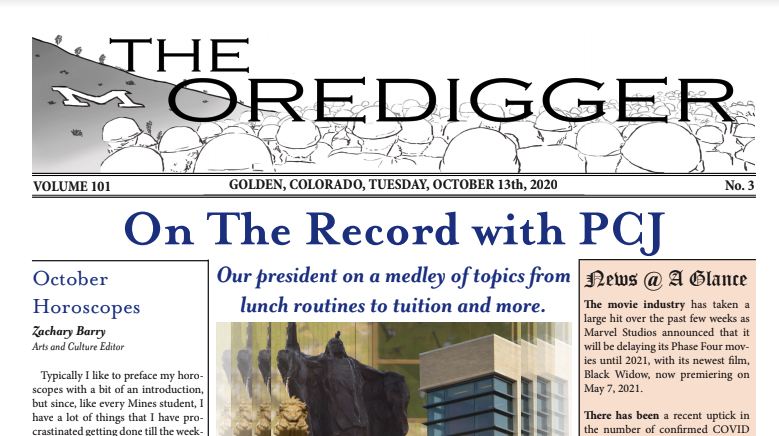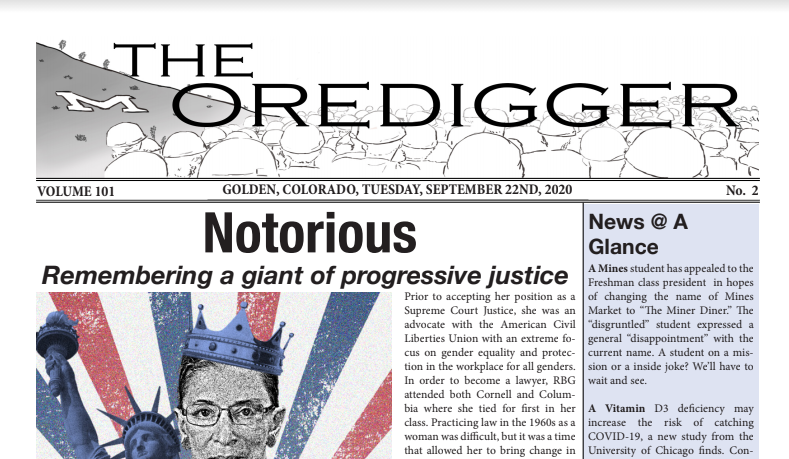Everyone remembers being the “new kid” and their first day walking into preschool, or maybe that first day after a big move. Sometimes it is tough being a newcomer in an unknown environment Dr. Becky Lafrancois, a Ph.D. in economics, is one of the newest addition to the Colorado School of Mines faculty and is in her first semester in teaching at Mines. As an economics professor coming to an engineering school such as Mines, there definitely will be some transitions for Dr. Lafrancois, but with eager-to-learn students, the transition will be smooth. Lafrancois had a few things to say about her experience teaching at CSM to The Oredigger.
[Oredigger]: Can you go a little into your background? Where did you go to school, what did you study, and when did you get your doctorate?
[Lafrancois]: Sure, I did my undergraduate work at Bryant University which is a small college just outside of Providence, Rhode Island. There I studied finance and economics, though I was originally an actuary math major. That’s how I got into economics, with my strong math background. I found out I didn’t want to be an actuary so I said, “What do I want to do?” I thought it would be really cool to be a professor. It came down to choosing between teaching finance and teaching economics. I ended picking economics because you can apply it to all kinds of different areas, as opposed to just finance which is pretty narrow. I started looking for PhD programs in economics. At that time I was interested in studying education policy, and ended up in Syracuse University. I was there from 2005 to 2010 where I did both my Masters and PhD, which is in economics. While I was at Syracuse I changed my research focus to energy, so my dissertation looks at energy policy issues, dealing with investment and generation decisions that were made in the electricity sector and how different policies can influence those decisions. After that I went to Michigan Tech and was an assistant professor. Then I came here.
What makes economics interesting to you?
I went into economics because I think it’s a field that you can apply to any situation. From deciding if you want to go to class in the morning to looking at electricity sector decisions to looking at growth in the economy, it’s just a field that’s very versatile.
What was the thought process of wanting to pursue higher education? Many students are unsure of what they want to do in the future: start working with a Bachelor’s, go to graduate school, etc. Can you explain the decision making on doing that? Maybe there’s a cost-benefit analysis involved?
[Laughs], I actually did not do a cost-benefit analysis. I really knew that I wanted to be working in the academic environment, especially in higher education. For me to do that, I knew I had to get a Ph.D., or at the very least a Master’s. My decision at the time I thought was pretty straightforward. I said, “Okay, I want to do this” and went to grad school to be done with my Ph.D. by 27, then go start working. In retrospect, it might have been a good thing to go work for a couple of years. Whenever I talk to undergraduates who are looking to go to graduate school, I always present them with the option of taking a couple years and going to work, especially if they’re interested in doing a Ph.D. down the road. I think it’s very helpful to get an idea in what your true research interests are and also have the ability to pull that real life experience into the classroom.
In light of the recent career fair, many students are scouring for possible internships. What advice do you have for them?
Get one! Make sure your resume is formatted correctly. I know that sounds kind of stupid but it can make a big difference. Work on presenting yourself in a professional manner. When you’re competing against all kinds of people who have similar high GPAs and really good leadership experience then it really comes down to the little things– not necessarily the font of your resume, but just making sure that everything looks good. More importantly, when you meet people, make sure you look them in the eyes and have a firm handshake. I think given that you’re competing against very strong candidates, the little things do make a difference.
How many classes do you teach at Mines, and is it just the two sections of Principles of Economics, or are there more?
This semester it’s just those two, but in the spring I’ll be doing a third class.
What’s it like working with so many TAs? Is it like commanding a squadron of minions or is it perhaps less involved than that?
I’m still learning. It’s kind of like being a manager. I’ve never had one TA before let alone ten. It’s been pretty interesting. I’m learning on the fly.
What is the best part about teaching at Mines?
I love working with students who are excited about learning. It’s nice to work at a place like Mines where everyone is a good student; it’s a lot of fun.
What is your least favorite part about teaching at Mines?
Well, teaching economics, most people think it’s the “easy subject” and while the principles level of economics might be not super technical, the higher levels of economics are more advanced. I really get annoyed when people sit around in class and just make fun of the theories we talk about. We cover both micro and macroeconomics in one semester so it’s difficult to go into the higher level issues.
Are big 150-plus student lectures intimidating to handle, like walking into a big room with tons of people staring at you?
I was so nervous the first day, but once I got up there I realized that if you can talk in front of five people you can talk in front of 300 people.
One of the methods used to unify a big class in participation is through the “iclicker” questions. What are your thoughts on that system and how it is used at Mines?
I like them. It forces you guys to work on a problem. If I just ask you to do a problem, you might just sit there and talk to your friends. For me as a professor I can look at the data and see that 90% of students got that right and I can move on. Whereas if there’s more division, I can spend more time on that question. It’s good for you guys because it gets you more involved than if I stood up there talking for 50 minutes, and it’s also good for me since I get involved as well.
As a teacher, you readily use Twitter for class information, send out constant email updates, and of course have access to the digital iclickers. What is it like using social media and other 21st century electronic assets to supplement teaching a college class?
I just got my first smart phone yesterday! I’m still figuring out how to use it. I have a Twitter account that I haven’t tweeted on yet and I have a professor Facebook account which I haven’t really used either. It’s fun being able to integrate social media into the classroom but it’s also a little bit challenging to create this bridge between your personal social media and your professional social media, and where to draw the line between the two. That’s still a work in progress for me even though I grew up in the Facebook era.
Favorite TV show?
Chopped
Favorite musician or artist?
Led Zeppelin
Favorite famous person?
Martha Stewart, because she turned from going to jail to becoming really successful.
Favorite place to eat?
I like Middle Eastern restaurants, though I just moved here so I don’t have a local favorite yet.
If you had to tell the whole population of Mines one useful tidbit of information, what would it be?
Live life in a way that if you think you would have said, “I should have done that,” go do it. Don’t be one of those people who live their life saying, “I should have…” To follow that up, by the time I was 30 I hit six continents, meaning I accepted the different opportunities that came up.



'Faculty Spotlight: Dr. Becky Lafrancois' has no comments
Be the first to comment this post!